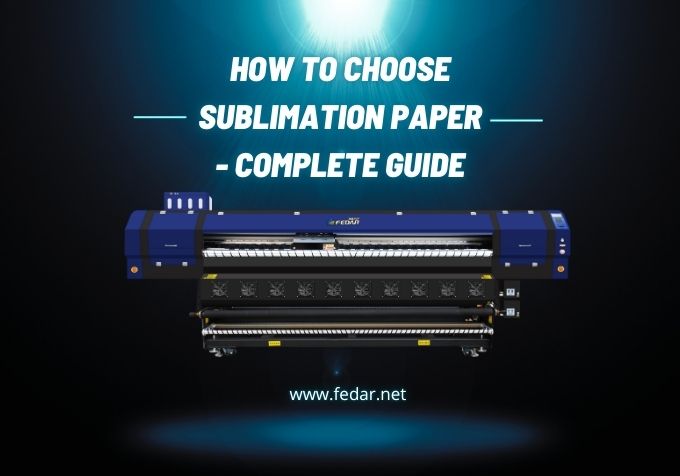17
Nov
Which sublimation paper should you choose? How to get vibrant prints that last!
Choosing the right sublimation paper is very important for getting the best results. This article will teach you how to choose the best sublimation paper to get good-quality and durable transfers. Whether you’re a beginner or a pro, knowing your sublimation paper will help you make the right decision.
Sublimation paper comes in several types, each with different characteristics such as thickness, coating, and drying time. These affect the transfer quality and the final look of your designs, so you should choose a paper that fits your needs.
Standard sublimation paper has good color transfer and is the best choice for polyester fabrics and coated surfaces.
Tacky sublimation paper has an adhesive coating that is great for materials that move during heat pressing, like stretchy fabrics. The adhesive ensures accurate alignment and minimizes ghosting on substrates like sportswear.
For high-speed printing, fast-dry paper dries quickly to prevent smudging. This quality makes it ideal for bulk printing as it’s more efficient and allows for quicker stacking.
High-release paper transfers a lot of ink, so it is best for projects that need bold and bright colors. It also leaves minimal ink residue for sharp prints.
Choosing the right sublimation paper involves considering substrate compatibility, ink absorption, and drying time. Here are the key things to think about:
Not all sublimation papers are suitable for all substrates. Polyester fabrics and coated hard surfaces produce the best results, but some substrates may need specialized sublimation papers. For example, tacky sublimation paper is better for fabrics that have the potential to move during heat pressing.
Papers with high ink absorption rates hold more ink, which is important for vibrant colors. High-release paper is good for color-heavy designs as it allows more ink saturation.
Sublimation paper weight is typically 70-120 gsm (grams per square meter). Heavier papers of 90-120 gsm are stable and hold more ink. There is less chance of curling, and heavier papers are better for thicker materials.
Fast-drying papers need to be used to avoid smearing, especially in cases where you have to print in a larger quantity.
Tacky sublimation paper will reduce movement while it is being pressed. They are ideal for printing onto athletic garments where positioning needs to be quite accurate to achieve the desired results.
Using a combination of these parameters will assist in guaranteeing that most transfers are up to standard and will help to avoid scenarios where blurring or incomplete transfers are present.
The main factor that will significantly affect the results is the sublimation paper you use. Below are some of the indications that can help in identifying a high-quality paper:
High-quality sublimation paper allows for good ink transfer. Try an image first to see how bright it gets with color and if the paper is any good at retaining and transferring ink images.
The paper should have a thin layer, and it should be even. Rough patches will have a negative influence on the amount of ink that is transferred and the overall quality of the image on the paper.
Check the paper after a test print to check transfer efficiency. The lesser the ink residue, the higher the transfer efficiency of your paper.
Checking sublimation papers will ensure consistent, professional results for your projects.
For the sake of getting amazing results depending on the project, use sublimation papers suited to the material on which you want to print. Recommendations for the below applications:
Tacky sublimation paper is great for T-shirts, hoodies, and other apparel when you are working with stretchy fabrics. This is a kind of paper that helps provide stability for designs to stay in place when the pressing process takes over, minimizing how often things get misaligned.
If you need pillows, blankets, or curtains, standard or high-release paper produces bright colors that pop for textiles.
Fast-dry sublimation paper is most productive on ceramics, mugs, and tiles. It dries fast with little chance of smudging, allowing for a smooth, crisp application.
Fast dry sublimation paper is also used in bulk printing. They make it possible to complete printing in a few minutes.
Paper that is suitable for your specific project type will ensure that the prints are clean and that the production process will run smoothly.

Choosing the wrong kind or low-quality sublimation paper may result in poor outcomes. Here are some common mistakes to avoid:
The papers are different for different substrates; it is possible to use the standard paper on the stretchy material and get bad alignment.
Some lightweight papers curl, thus causing alignment problems. For larger projects or thick substances, generally, thicker papers can be more trusted and manageable.
Low transfer efficiency reduces the printed image quality and consumes more ink.
Sublimation paper affects the quality and longevity of your prints. You can make a good decision based on criteria such as compatibility of the types of substrate, time for drying, compatibility of ink, and the requirements of a particular job to be sure that the colors will be bright and the result long-lasting. Obtain high-quality paper and avoid common mistakes. Using the right sublimation paper on your prints ensures they come out perfect in terms of color and durability and in line with your vision.
If there's anything we can do to further showcase machines' features, please let us know.
Email: sale@fedar.net
Whatsapp: http://wa.me/8615515715397
Our company has over 30 models of printers with independent intellectual property rights and patents. Marketed under the esteemed brands of Skycolor, Stormjet, and Fedar brands, these printers cover a wide range, including digital textile printers, UV printers, eco-solvent printers and more. Known for their exceptional quality and performance.
